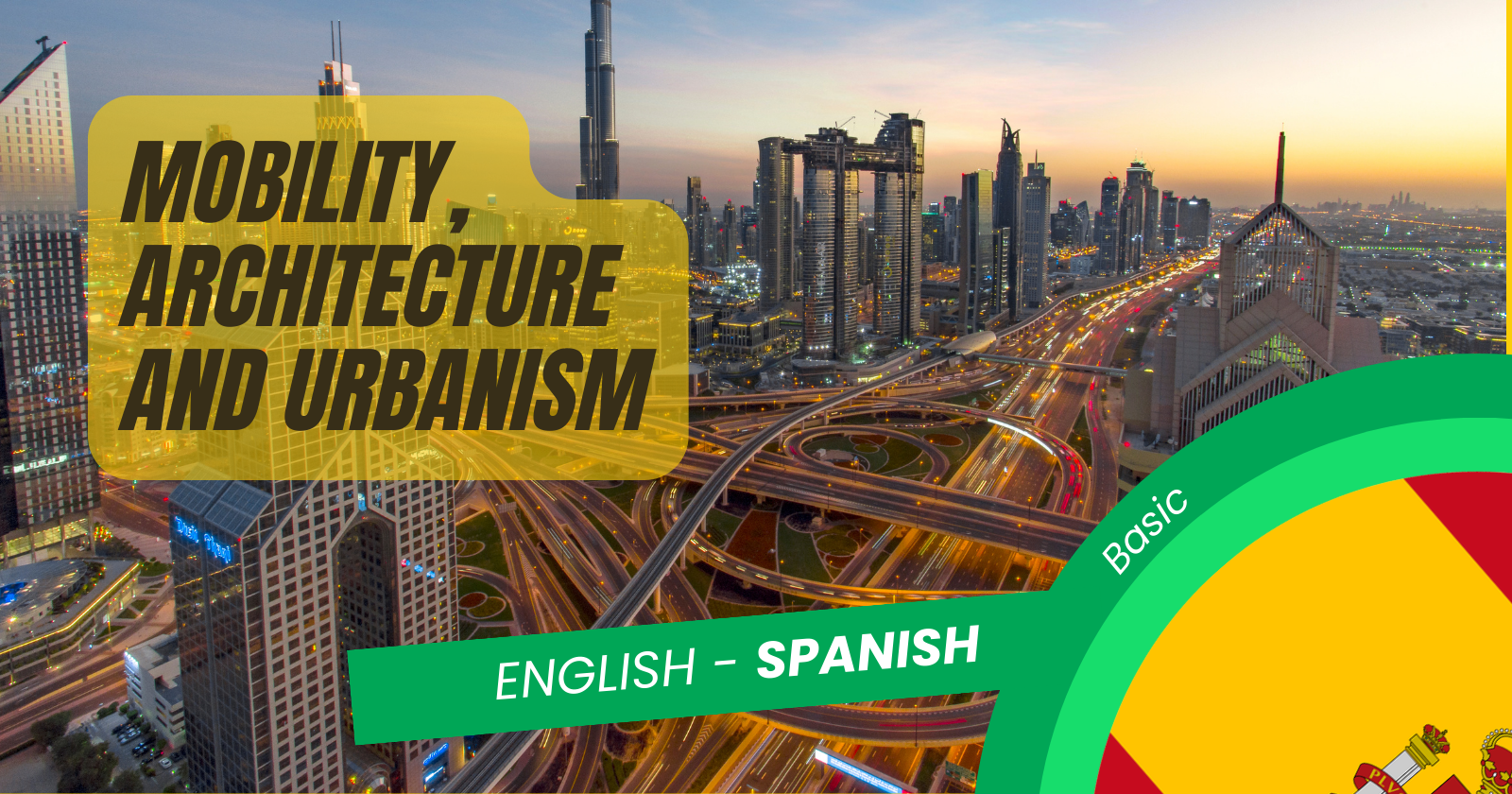🇪🇸 Mastering Basic Spanish Vocabulary: Mobility and Architecture Terms
 Jan Sovis
Jan Sovis
This lesson is not just about learning vocabulary; it's about opening doors to new cultural and architectural experiences. Whether you're planning a trip, interested in urban design, or just love exploring new places, these words will be your guide.
📘 Topics Covered
🚗 Travel and Transportation: Discuss "the trip" (el viaje) and plan your next "the vacation" (las vacaciones) abroad (en el extranjero). Talk about various modes of transport like "the car" (el coche), "the train" (el tren), and "the plane" (el avión). Share your experiences of "the drive" (el viaje) or "the flight" (el vuelo).
🏗 Architecture and Urban Life: Marvel at "the building" (el edificio) and "the architecture" (la arquitectura) of famous cities. Discuss "the bridge" (el puente), "the castle" (el castillo), and "the palace" (el palacio) you've visited or wish to visit.
🌆 Navigating Cities: Navigate through "the street" (la calle), "downtown" (el centro), and "the neighborhood" (el vecindario). Learn about "the hotel" (el hotel) stays, "the restaurant" (el restaurante) visits, and "the shopping" (las compras) experiences in various "the city" (la ciudad) and "the town" (la ciudad).
🎧 Why Listen to Our Audio Course?
Polyglotic's audio course uses AI-powered voices, so that you can feel like you're learning from a native speaker. Each word and phrase is clearly explained, with practical examples to illustrate their use. This approach is ideal for beginners eager to learn Spanish in the context of real-world scenarios like travel, architecture, and city life.
Conclusion
Are you excited to talk about your travel adventures, architectural interests, and urban explorations in Spanish? Join us in this captivating lesson and start your journey towards becoming a culturally aware Spanish speaker. With Polyglotic, you're not just learning a language; you're embracing a world of mobility and urban experiences. ¡Empezamos!
Audio-lesson
The lesson comprises a total of 3 parts, and you can find the second part right here.
Vocabulary list
Here, you'll find words for the second part of the lesson.
| English word & example sentence | Spanish word & example sentence |
| ... | ... |
| flying – Flying is faster than driving. | el volar – Volar es más rápido que conducir. |
| foreign – She speaks several foreign languages. | extranjero – Ella habla varios idiomas extranjeros. |
| gate – The gate to the garden was locked. | la puerta – La puerta al jardín estaba cerrada con llave. |
| go – Let's go to the park. | ir – Vamos al parque. |
| guide – The guide led us on a hiking trail through the mountains. | el guía – El guía nos llevó por una ruta de senderismo por las montañas. |
| hall – He ran down the hall to catch the elevator. | el pasillo – Corrió por el pasillo para coger el ascensor. |
| highway – We took the highway to get to the beach faster. | la autopista – Tomamos la autopista para llegar a la playa más rápido. |
| hotel – They're staying at a nice hotel for their honeymoon. | el hotel – Van a pasar su luna de miel en un buen hotel. |
| international – The company has offices in multiple international locations. | internacional – La empresa tiene oficinas en múltiples ubicaciones internacionales. |
| journey – The journey to the mountains was breathtaking. | el viaje – El viaje a las montañas fue impresionante. |
| kilometer – The next town is ten kilometers away. | el kilómetro – El próximo pueblo está a diez kilómetros de distancia. |
| land – The plane landed safely on the runway. | aterrizar – El avión aterrizó de manera segura en la pista. |
| leave – I have to leave the party early to catch a flight. | salir – Tengo que salir de la fiesta temprano para tomar un vuelo. |
| lift – Can you help me lift this box? | levantar – ¿Puedes ayudarme a levantar esta caja? |
| local – The local market sells fresh produce. | local – El mercado local vende productos frescos. |
| lorry – A lorry was parked outside the store. | el camión – Un camión estaba estacionado afuera de la tienda. |
| lost – She searched for her lost keys. | perdido – Buscó sus llaves perdidas. |
| map – Check the map for directions. | el mapa – Consulta el mapa para obtener direcciones. |
| missing – The missing book was eventually found. | faltante – Finalmente se encontró el libro faltante. |
| mobile – The app is available on mobile platforms. | móvil – La aplicación está disponible en plataformas móviles. |
| motorcycle – He rides his motorcycle to work every day. | la moto – Va en moto al trabajo todos los días. |
| move – We have to move to a new city. | mudarse – Tenemos que mudarnos a una nueva ciudad. |
| neighbor – My neighbor is always mowing his lawn on Saturdays. | el vecino – Mi vecino siempre está cortando el césped los sábados. |
| neighborhood – I grew up in a quiet neighborhood. | el vecindario – Crecí en un vecindario tranquilo. |
| nowhere – The road leads to nowhere. | en ninguna parte – El camino no lleva a ninguna parte. |
| palace – The queen lives in a palace in London. | el palacio – La reina vive en un palacio en Londres. |
| parking – The hotel offers free parking for guests. | el aparcamiento – El hotel ofrece aparcamiento gratuito a sus huéspedes. |
| pass – We watched the boats pass by on the river. | pasar – Observamos cómo los barcos pasaban por el río. |
| passenger – The airplane had hundreds of passengers on board. | el pasajero – El avión tenía cientos de pasajeros a bordo. |
| passport – He lost his passport while abroad. | el pasaporte – Perdió su pasaporte en el extranjero. |
| petrol – The car runs on petrol. | la gasolina – El coche funciona con gasolina. |
| place – I need to find a place to park my car. | el lugar – Necesito encontrar un lugar para aparcar mi coche. |
| plane – The plane flew over the mountains. | el avión – El avión voló sobre las montañas. |
| population – The population of the town is rapidly growing. | la población – La población de la ciudad crece rápidamente. |
| post office – The post office is closed on Sundays. | la oficina de correos – La oficina de correos está cerrada los domingos. |
| railway – The railway system in this country is very efficient. | el ferrocarril – El sistema ferroviario en este país es muy eficiente. |
| reach – Can you reach the top shelf? | llegar – ¿Puedes llegar al estante superior? |
| region – The desert region is known for its extreme temperatures. | la región – La región desértica es conocida por sus temperaturas extremas. |
| ride – We ride bikes in the park. | montar – Montamos bicicletas en el parque. |
| road – The road leads to the city. | la carretera – La carretera conduce a la ciudad. |
| ... | ... |
Subscribe to my newsletter
Read articles from Jan Sovis directly inside your inbox. Subscribe to the newsletter, and don't miss out.
Written by
